Product Development of Cordial from Karonda Fruit for Health
Main Article Content
Abstract
The objectives of this research were to develop a recipe of cordial from karonda fruit for health and to study customer satisfaction towards the product of cordial from karonda fruit for health. An experimental and quantitative research approach was employed. The study was divided into 3 experimental phases. In Phase 1, the study focused on the quantities of cordial from karonda fruit at 5 levels of production: 100 grams, 150 grams, 200 grams, 250 grams, and 300 grams. Through the evaluation by 10 experts, it was found that cordial from karonda fruit with quantities of 200 grams, 250 grams, and 300 grams received the highest overall likability scores. Therefore, these three recipes were chosen to gather satisfaction. In Phase 2, the cordial from karonda fruit recipes with quantities of 3, 4, and 5 were selected for data collection, using a questionnaire survey from 160 customers in Pattaya, Chonburi Province. The sample group was selected by using a convenience sampling method. The sensory quality was evaluated using a 9-Point Hedonic Scale for liking. In Phase 3, to analyze the data, mean percentage, standard deviation was carried out. The research findings indicated that customers rated the highest satisfaction for the cordial from karonda fruit for health with recipe number 5, which contained 300 grams of karonda fruit, 300 milliliters of clean water, and 40 milliliters of sweetened lemongrass syrup. The second highest rated recipe is number 4, which contained 250 grams of karonda fruit, 300 milliliters of clean water, and 40 milliliters of sweetened lemongrass syrup. The third highest rated recipe is number 3, which contained 200 grams of karonda fruit, 300 milliliters of clean water, and 40 milliliters of sweetened lemongrass syrup. When considering individual aspects, customers showed the highest satisfaction in terms of taste, followed by color and aroma, all at a neutral to moderate liking level. The research results can be used to further develop new beverage products and create added value for agricultural product.
Article Details

This work is licensed under a Creative Commons Attribution-NonCommercial-NoDerivatives 4.0 International License.
Article Screening Policy
- All research and academic articles to be published must be considered and screened by three peer reviews in the relevant field / article.
- All articles, texts, illustrations and tables published in the journal are the personal opinions of the authors. Editors don't always have to agree. And no responsibility whatsoever is the sole responsibility of the author.
- The articles to be published must never be published. Where did you first publish? And not in the consideration of other journals If the audit found that there has been a duplicate publication It is the sole responsibility of the author.
- Any article that the reader sees as being plagiarized or impersonated without reference. Or mislead the work of the author Please let the journal editor know it will be your greatest blessing.
References
Chaiyo, M. (2011). Qualitative comparison of banana syrup from refined sugar and nonrefined sugar. (Master Thesis of Science Education). Silpakorn University.
Cronbach, L. J. (1970). Essentials of Psychology Testing (5th ed.). New York: Harper Collin.
Hair, J. F., Black, W. C., Babin, B. J. & Anderson, R. E. (2014). Multivariate Data Analysis 7th Edition. Pearson Education, Upper Saddle River.
Ithankar, P.R., Lokhande, S.J., Verma, P.R., Arora, S.K., Sahu, R.A., & Patil, A.T. (2011). Antidiabetic potential of unripe Carissa carandas Linn. fruit extract. Journal of Ethnopharmacology. 135(2), 430-433.
Kayyen. T. (2017). Effecting of Maturation Stage on Biological Properties of CARISSA CARANDAS. (Master Thesis of Science). Silpakorn University.
Khuenpet, K., Suvarnakuta, P., Polpued, R., & Jaru-arayanun, R. (2018). Development of Healthy Hom-Thong Banana Powder. Thai Science and Technology Journal, 27(6), 1023-1037.
Pornpitakdamrong, A. (2013). Ice Cream from Karanda (Carissa carandas L.) Fruit, The Ancient Thai Herb. Research and Development Journal Suan Sunandha Rajabhat University, 8(1), 194-204.
Rattanawongsanit, M. (2019). Development of Processing of Half-Ripened and Fully Ripened Karanda (Carissa carandas) Fruit. (Master Thesis of Science Education). Valaya Alongkorn Rajabhet University.
Rittilert, P. & Warin, K. (2019). Karanda (Carissa carandasL.) Gummy Jelly Product. Thai Journal of Science and Technology, 9(2), 342-354.
Sarkar, R., Kundu, A., Banerjee, K., & Saha, S. (2018). Anthocyanin Composition and Potential Bioactivity of Karonda (Carissa carandas L.) Fruit: An Indian Source of Biocolorant. LWT, 93, 673-678.
Songsawat, K. (2018). Factors Affecting Consumers Decision to Purchase Concentrate Karanda Juice. (Independent Study Master of Science). Kasetsart University.
Supapattranon, Ph. (2018). Factors Affecting Service satisfaction on Pub and Restaurants of User in Bangkok Area. (Independent Study Master of Management). Mahidol University.
Thepparat, T. (2016). Production of Babana Syrup. Pathumwan Academic Journal, 6(16), 7-14.
Thiraphoo, K. (2017). The Restaurant’s Business Affecting the Behavior and Satisfaction of Customer at Riverside Restaurant Around City Historical are in Phranakhon Si Ayutthaya province. (Independent Study Master of Business Administration). Phranakhon Si Ayutthaya Rajabhat University.
Waengphula, S. (2015). Development of Karanda products. (Master Thesis of Business Administration). Burapha University.


